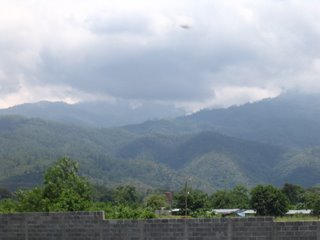When we walk to school at 6:30 am, the dusty, uneven road to the town center is quiet. There are no trucks swerving right and left to avoid the rises and plummets of the rolling cobblestone-and-dirt street, but a few red and white mototaxis with three wheels race passengers to their destinations. Small groups of subdued, sleepy schoolchildren in uniforms—white shirts and blue skirts, green pants with light green shirts, gym t-shirts and warm-up pants—wait for the bus or walk to school. The walk is long—twenty minutes, at least—but the air is cooler so early in the morning. Sometimes we get a ride in the back of a pickup truck, speeding along at an exciting clip, except where we must pass over the muertos (dead people—a slang name for speedbumps) near a giant cigar factory. I hear that the cigars are imported to America, and that you can’t buy them here anywhere.
At the school, the watchman lets us inside the wall surrounding the school grounds. During the night, the watchman is a big old man with missing teeth, a cowboy hat, and a gun. The dayshift man, however, looks considerably less like a cartoon. The school buildings are made of cinderblocks, with bars and screens in the windows and big metal doors leading to each classroom. The pasillo, or hallway, opens into the school yard on both sides. The tin roof flexes in the heat, making a sound as if a sporadic hailstorm where constantly passing through the area.
The Junior High classrooms, in a separate two-room building on the grounds, were not ready at the start of school, so my students have taken up temporary residence in the library and an empty classroom that will be the teacher’s lounge. It has been a frustrating experience, particularly since every teacher’s book I have read emphasizes the importance of the start of the year as setting the tone. I am finding it difficult to make the students feel welcome and establish a routine when I cannot decorate or arrange books and materials. (Yes, the tone I myself adapt for this narration is considerably calmer than the one I used the night before school started when I learned about the delay.) The classrooms are supposed to have electricity by Monday. I’m hopeful, but not convinced.
The students, for the most part, are well behaved. The ninth grade boys are constantly whining, “Missss, he’s touching me!” They also, however, tend to participate more in class. The ninth grade girls are on the whole quieter and more serious. Their first journal entries ranged from the boring but true (too-cool-for-school girl writes [paraphrased from memory]: “I like music. My favorite music is salsa, meringue, reggaeton...”) to the endearing (cool guy writes: “I want to learn more about you and Miss ____) to the fascinating (bookish, hard-home-life kid writes of a pen pal friendship: “I know she loves me but it is very hard for us because of distance.”) In the combined seventh-eighth grade, there are only six chatty but adorable girls. They are much further behind in English. Their speech sounds like, “I think I....conocer...?”) Their wishes, according to their writing, range from wanting to visit the Bay Islands to becoming a doctor to being the best student in the class to traveling the world, to traveling the world as a model flight attendant. The last one might mean the best flight attendant, but I bet the intention was two professions rolled into one.
I’m learning a little more Spanish—some words here and there, like ganchas (clothespins)—and speaking it more than I ever, ever did in the US. I can more often follow a conversation than participate in it. As of yet, I am an extremely uninteresting conversationalist.
One major gripe I have with Honduras is that the constant sweating is wreaking havoc on my skin. The sunscreen and bug spray don’t help, either. I was born for a temperate climate! I have begun liberal use of baby powder, and I have begun dreaming of having a shower at school for when I arrive in the mornings. Ideally I would take about three showers a day, but I would never be able to wash all the clothes I would constantly be changing into. (Have I mentioned that laundry without a machine is a huge hassle?) Plus our water goes out very frequently. We have water most consistently in the afternoons, because the storms come in the evenings and then the water usually stays shut off until sometime the next morning. Nothing like waking up in the morning to realize that everybody is going to have to bucket flush the toilet before going to school.
Tonight we’re going to karaoke at the house of some prominent (read: wealthy) folks. I’m hoping there will be food—it’s so much easier when we don’t have to cook for ourselves. The most common foods served are: papusas, a ball of quesillo (a kind of cheese) enveloped in tortilla dough, and balleadas, made of thin flour tortillas folded in half, with refried beans inside and also a thin cream squiggled out of a bag, like frosting. There are also catrachas, a fried tortilla topped with refried beans, hard cheese, and sometimes (maybe with another name) diced cabbage and carrots. Once at school we were served hot dog rolls and cream, mantequilla, as a snack. (Shudder.) When we were in Triunfo at the beach last weekend, I had some toast and refried beans as a snack and it tasted awesome. I suddenly had the thought that I’ve been missing out on a wonderful thing all of these years. Good thing I came to Honduras, huh?





